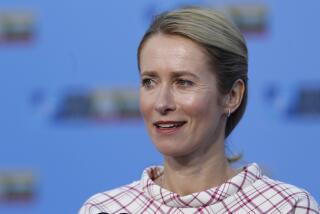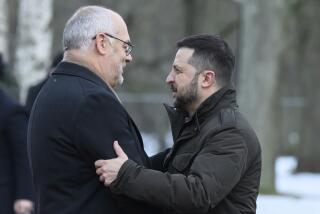Estonia Warned by Gorbachev : Secession: The Soviet president threatens reprisals over republic’s independence move. Talks in Moscow fail to ease tension over Lithuania.
MOSCOW — Soviet President Mikhail S. Gorbachev on Wednesday warned Estonia’s leader that his Baltic republic’s independence drive could trigger Kremlin reprisals.
Arnold Ruutel, president of the Switzerland-sized republic, told official Estonian television and radio Wednesday that an angry Gorbachev had phoned him earlier in the day to criticize the Estonian Supreme Soviet for declaring the republic an occupied land.
“When I heard of your resolution, I was completely beside myself. You must declare the resolution null and void. It is an invalid one,” Ruutel quoted Gorbachev as saying.
In a resolution last week, the Estonians declared Soviet rule invalid and announced a “transition period” that would lead to a restoration of independence. They thought that by choosing a more gradual approach than the Lithuanians, they could head off a clash with Moscow. But they may have miscalculated.
Ruutel said Gorbachev warned him: “It seems to me I have to introduce similar measures as those taken in Lithuania.”
Talks between Moscow and Lithuania, a Baltic neighbor republic of Estonia that has declared independence, ended Wednesday with an aborted meeting and no hint of relaxed tensions.
Ruutel did not say if Gorbachev mentioned specific steps against Estonia. However, to bring Lithuania to heel, the Soviet president has ordered its citizens to hand over firearms for safekeeping and tightened border controls.
Soviet soldiers have also seized buildings in Lithuania, buzzed cities in warplanes and swept through hospitals to arrest army deserters who took refuge there.
Estonian TV reported that Ruutel said Gorbachev became calmer after he explained Estonia’s position and said it would not renounce its drive for independence. The legislature’s deputy Speaker, Marju Lauristin, said Gorbachev demanded a full report from Ruutel on the situation in Estonia. Lauristin said that one would be sent as soon as possible.
On Tuesday, the 105-member Estonian Supreme Soviet elected Edgar Savisaar, now chairman of the People’s Front, as the republic’s new prime minister.
Savisaar said the main task of his Cabinet will be to restore Estonia’s full independence. He said Communists would not be excluded from the government but indicated that their role would be diminishing.
Until Wednesday, the Lithuanians’ first high-level talks with Moscow since their unilateral declaration of independence had seemingly heralded an easing in the contest of wills waged over the past three weeks.
However, the three-member delegation that met Tuesday with Politburo member Alexander N. Yakovlev, a key Gorbachev ally, left Moscow after a Wednesday morning appointment with Interior Minister Vadim V. Bakatin was reportedly called off.
“The meeting did not take place,” Lithuania’s chief representative in Moscow, Egidius Bickauskas, said without giving a reason. Interior Ministry officials contacted by telephone said they could give no information and refused to confirm even that a meeting was scheduled.
After returning to Lithuania’s capital, the head of the would-be independent country’s delegation said he foresees no change in relations with the Soviet leadership as a result of the talks with Yakovlev, who is one of Gorbachev’s closest advisers and is widely considered to be the architect of many of his political and social reform policies.
“There’s a certain tension, and I’m convinced the tension will continue for a long time,” Lithuanian Deputy Prime Minister Romualdas Ozolas told a news conference at the Parliament building in Vilnius. “It was just a normal talk, taking into account the situation that we are in in Moscow’s eyes.”
However, Lithuania’s president, Vytautas Landsbergis, to whom Ozolas reported on his return, was more upbeat. “Before we were talking at each other. Now we are talking to each other,” Landsbergis told the reporters.
But if there were concrete results of the meeting, they were not disclosed by the Lithuanians. Asked repeatedly if they succeeded in obtaining a commitment from Moscow for future talks, the delegates declined to answer.
They had hoped to meet with Bakatin some other time this week. The Lithuanians said their request to meet with Defense Minister Dmitri T. Yazov has been rebuffed, with the general quipping acidly that he is not allowed to receive envoys of a foreign state.
At a government news briefing, Soviet Foreign Ministry spokesman Yuri A. Gremitskikh called the meeting with Yakovlev a positive development, but also wouldn’t say what, if anything, it may have yielded.
Any compromises, he stressed, would still have to come from Vilnius.
“Our colleagues in Lithuania just have to tear themselves away from their narrow views and look at all these problems through the prism of the fact that a new basis for the federation is being created,” Gremitskikh said, referring to measures making their way through the Soviet legislature to redefine the country’s political compact.
On Tuesday, the Supreme Soviet adopted a law that for the first time sets down the procedure for a republic to leave the Soviet Union. However, its conditions--including the approval of two-thirds of the voters in a referendum and a five-year transition period--have been attacked as too stringent by activists from outlying republics.
Moreover, nationalists in the Baltic lands of Estonia, Latvia and Lithuania say the law cannot apply to them because the formerly independent states did not willingly join the Soviet Union but were forcibly annexed as a result of a 1940 agreement between Nazi Germany and the Soviet Union.
Gorbachev has demanded that the Lithuanians annul their March 11 independence proclamation before full-scale discussions on the republic’s status can take place. However, Landsbergis on Wednesday again refused, saying “we emphasize that we are ready to discuss all issues except repeal of the declaration of independence.”
In Latvia, independence will also be on the agenda when the local Communist Party opens a congress on Friday. Like their Lithuanian and Estonian comrades, the Latvians are expected to split into a pro-Moscow faction and one in favor of independence.
Gorbachev met in Moscow on Wednesday with top Latvian Communists, including the party’s first secretary, Janis Vagris, according to Benita Petkevicha of the republic’s official Latinform news agency. Arnold Klaucens, party chief in the capital of Riga, told Latinform “the meeting demonstrated once again that the Latvian CP ((Communist Party) has already become independent, and this subject wasn’t even raised.”
Sajudis, the grass-roots, pro-independence group that carried Landsbergis to power in Lithuania, had called for a massive rally Wednesday in Vilnius to show support for his leadership but canceled it to avoid a clash with Communists loyal to Moscow who scheduled a protest at the same site.
About 5,000 members and supporters of the loyalist Lithuanian Communist Party rump demonstrated at a library next to the Supreme Council building where Parliament meets. They carried Soviet flags and banners reading “The Parliament is Ready to Bury Us Alive” and “We Listen Only to the President of the U.S.S.R.”
Sajudis-sponsored rallies took place as planned in the cities of Kaunas and Klaipeda. The Vilnius demonstration was rescheduled for Saturday.
Free-lance writer Esther Schrader reported for The Times from Vilnius.
More to Read
Sign up for Essential California
The most important California stories and recommendations in your inbox every morning.
You may occasionally receive promotional content from the Los Angeles Times.










